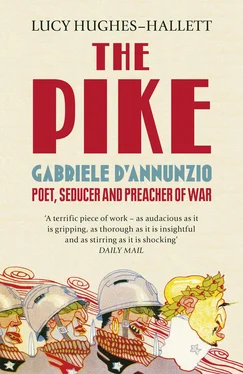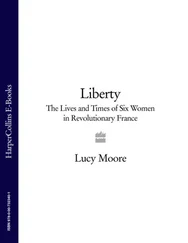The city was full of fervent nationalists. Again and again d’Annunzio was called upon to address them. In four days he spoke seven times. His speeches were reported all over Europe. Italian government ministers were nervous: they were engaged in secret negotiations of the utmost delicacy and d’Annunzio was a dangerously loose cannon. Sonnino called his appearance at Quarto ‘clowning’. Foreign Minister Marini dismissed it as ‘stupid’. But French reporters were full of admiration and gratitude. His enemies were respectful too: a German cartoon, showing him ranting and frenzied, was captioned ‘all would go well if we had cannon of the calibre of his big mouth’.
What seemed to be taking place in Genoa was the transfiguration of d’Annunzio from dandy-poet into national redeemer. But when he stepped back into the privacy of his hotel room he was still the incorrigible spendthrift and libertine. Ugo Ojetti, who had arrived in Genoa with him, wrote to their mutual editor and friend Luigi Albertini that week, imploring Albertini to use his influence on the poet, who was in danger of compromising his own reputation and the interventionist cause. ‘He’s only interested in snouting around under the most disreputable skirts.’ A hostile deputy was soon asking a parliamentary question expecting the answer ‘yes’ – whether it was true that Signor d’Annunzio had left Genoa’s Hotel Eden Palace without paying the startlingly large bill run up by himself and the two unidentified women who were accompanying him there?
It wasn’t only d’Annunzio’s personal renaissance that was less simple than it seemed. So too was his part in the political drama in which he claimed such a stellar role. He had come to urge his compatriots to repudiate the Triple Alliance and to agree to go to war alongside France, Britain and Russia, the nations subscribing to the Entente. Over the next two weeks he was repeatedly, and in increasingly virulent language, to denounce the government ministers who apparently hung back from doing so. But without his knowledge they had already done precisely that which he was urging them to do.
Throughout the winter, Prime Minister Salandra and his Foreign Minister Sonnino had been negotiating with both sides, and concluded that the terms offered by the Entente were the more attractive. On 26 April, while d’Annunzio was still in Paris, Italy’s rulers had secretly signed the Treaty of London with Britain and France, agreeing to enter the war on their side. On 1 May, Sonnino asked the cabinet to repudiate the Triple Alliance, so that he could reach an agreement with the Entente (an agreement that had in fact already been reached). On 3 May, the day before d’Annunzio took the train south, Salandra’s government formally (but still secretly) severed Italy’s ties with Germany and Austria-Hungary.
Later, d’Annunzio was to claim to have been privy to the government’s secrets all along, but he was lying. During the last few weeks of his time in France, he was gleaning information from the secondhand gossip of the press corps and peripheral politicians. He had no secret collusion with the authorities he was shortly to be subjecting to such furious verbal abuse. He didn’t know it, but in calling for intervention he was banging, noisily and with big gestures, on an already open door.
The morning after he spoke at Quarto, the city of Genoa presented d’Annunzio with an 800 kilo plaster cast of a fourteenth-century stone lion. He accepted the lion (emblem of St Mark and of the Venetian Empire he was intent on reviving) by delivering his first oration of the day. Homeless as he was, he was always pleased with titanic bric-a-brac. At noon he was speaking again, this time to Garibaldi’s veterans. That evening he was presented with a bronze shield by the mayor, and responded with more speechifying. With each oration he became more incendiary. He told the university students: ‘Go! You are the flying sparks of the sacred blaze. Go start the fire!’
After five days’ rest and recreation with his two female friends, he moved on to Rome. Salandra’s administration, secretly committed to military intervention, was at an impasse. The majority of Italians, including the King, the Pope and a large proportion of military leaders, still favoured neutrality, and so did parliament. The peace party was headed by Giovanni Giolitti, the liberal statesman whose canny pragmatism had already made him a hate figure for d’Annunzio. Giolitti had been premier four times. He was out of office in 1915 but he still dominated parliament, as he had done for nearly two decades. There he repeatedly argued against intervention in a war from which, in his view, Italy would gain next to nothing (he was to be proved correct). He had many supporters. Over 300 deputies left their visiting cards on him that month as a sign of solidarity.
Giolitti’s opponents, though, were more vociferous. All over Italy pro-war demonstrations were taking place. British visitor and aspiring politician Hugh Dalton reported there were ‘hundreds and thousands of good people of all classes walking slowly through the streets of Rome and other Italian cities, intoning with a slow and interminable repetition, “Death to Giolitti, Death to Giolitti”.’ In Rome the British ambassador Sir Renell Rodd estimated that the crowd assembled in the Piazza del Popolo to demonstrate in favour of intervention was 200,000 strong. ‘They were not the type which ordinarily furnishes demonstrations, but an orderly and disciplined throng which seemed to include the best of the bourgeoisie.’
These British witnesses were naturally inclined to think well of Italians eager to fight alongside their own country: their description of the demonstrators as being ‘the best’ people reflects their bias. The ambassador’s wife threw flowers over the embassy balcony to the pro-war demonstrators, even though Rodd himself – the secret of the Treaty of London not yet being out – had to keep mum. In truth not all of the interventionists were so ‘disciplined’ and ‘orderly’. In Rome neutralist politicians were beaten up in the street. The then magazine editor Benito Mussolini called upon his readers to, ‘Shoot, I say shoot, a dozen [neutralist] deputies in the back.’ But though, as Rodd put it, ‘the people had come down into the piazza’ and ‘manifested their will’, Salandra couldn’t mobilise the armed forces without parliament’s consent, and Giolitti commanded the majority in the house. Something, or perhaps someone, was needed to break the deadlock.
D’Annunzio arrived in Rome on 12 May. The reporter from the Corriere della Sera estimated that 100,000 turned out to meet his train. There were tumultuous scenes at the railway station. D’Annunzio narrowly escaped being trampled to death by his admirers before he was hustled into a car. Photographs show the Via Veneto crammed from end to end, a dark river of hats. Arriving at the Hotel Regina, he made it to safety through the kitchen door. Shortly thereafter he reappeared on a balcony, declaring his devotion to the King and the Queen Mother (who was known to favour intervention) and calling upon his listeners to turn on cowards and appeasers, the ‘enemies within’.
Repeatedly, over the next few days, he addressed the increasingly volatile crowds. Jean Carrère, correspondent with Le Temps, describes him: ‘Never have I seen an orator advance before the public with such composure. Standing on his improvised tribune he was magnificently alone, of a marble pallor, with two eyes of flame.’ He glittered. Another observer wrote of ‘the light gleaming off his bald pate and flashing off his spectacles’ (actually a monocle, which he called his ‘caramel’).
Over and over again, with a terrible, measured fury, he denounced the government of his country. He once wrote musingly about how, to one inflamed by desire, a woman’s mouth might seem like a flower, like paradise, like the luscious epitome of all delight, while days or hours later (with lust appeased) it could seem repellent – slimy, disgustingly warm, alarmingly muscular. Now the revulsion with which, in the past, he had recoiled from lovers and pleasures he had tired of, was turned on the social mores and political institutions of peacetime Italy. Rome was a sewer; its rulers were drivelling, stale-smelling old men; civilian life was a foul morass.
Читать дальше












